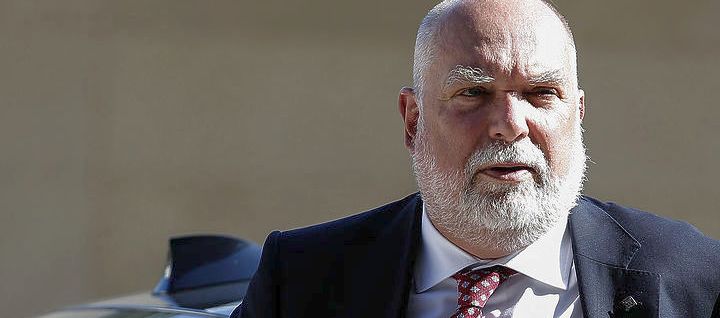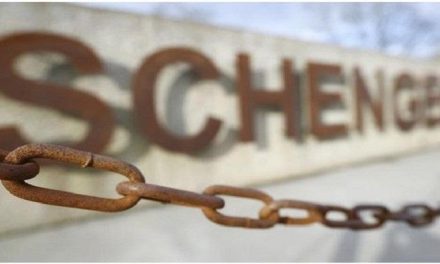Thomas Wieser, the outgoing chief of the Eurogroup Working Group (EWG), is an Austrian economist with extensive experience in macroeconomic policy and EU financial affairs. He ostensibly is one of the few Europeans who have known from the start and from within the economic crisis of the last decade and the reasoning behind decisions relating to Greece and the Eurozone as a whole. A few days before his retirement and departure from Brussels for Austria, the head of the EWG spoke to the Athens-Macedonian News Agency (ANA). In his personal review, he reaches a conclusion that can hardly be challenged that Greece’s success or failure in the future primarily depends on the Greeks themselves.
Let’s start with a general question. Do you think some things should have been done differently?
In retrospect, everybody is more intelligent than they are at the time. The fact is that Greece’s fiscal situation from the beginning of its membership in the Eurozone and even before was not what it should have been. Things would have turned out badly, that is, even without the crisis of 2008, but they would not have turned out to be so catastrophic. So the whole fiscal unravelling which led to the deficit of 15.6% of GDP was no doubt the absolute trigger. Why did this happen? One has to ask the politicians of the time why it happened. The astonishing thing for me is that this is a discussion which – unless I’m mistaken – has not taken place in Greece still. It has taken place in some other countries, but not in Greece.
However, the crisis was not just Greek.
The crisis obviously came of course at a juncture of world economic developments – it was just the wrong point in time and the wrong developments in the global economy. It was the era of financial deregulation and very bad financial sector supervision, and much too lax and expansionary US monetary policy, which led to the huge increase in global leverage, global debt and speculative capital flows. And then Lehman Brothers happened. That put the stability and liquidity and insolvency of a large part of the global financial system into doubt. Investors started questioning whether they should continue to finance back bonds and that maybe over time something bad would happen to the banks – and if something bad happened to the banks, maybe the sovereign state would have to step in. And if the sovereign state stepped in with sums that were too large, then maybe the sovereign state would also be at risk; so they then stopped buying government bonds.
But why mainly the Greek ones?
We were faced with a reversal of capital flows, which hit some countries much worse than others. And why worse for some countries? Because global investors had more trust in buying German bonds or French bonds, and given the economic policy situation in Greece and its fiscal and debt situation, there was no confidence that Greece would be honouring its debt. So no more capital flows.
Then people started wondering what to do. One opens the Maastricht Treaty and there is the so-called Article 125, that there is no bailout clause. Member states should not be bailed out, and it was so clear that the euro area did not have an economic instrument to utilize in such moments of stress. We therefore had to invent something. We proposed some solutions, but then some lawyers said you are not allowed to do this, it is illegal because it is against the Treaty. So you had to overcome all of these very significant problems of interpreting the Treaty and national constitutions in such a way that you could actually start putting into place a mechanism of the systems. At the beginning it was very clear to many people that this was not possible under the Treaty, so that we had to organize all other member states to voluntarily give money, the so-called Greek Loan Facility. And this way we somewhat managed to deal with this problem.
What happened next?
Then there was the problem of what kind of program to put together. Colleagues in the EU institutions had great experience in dealing with fiscal imbalances and financial sector issues, but nobody had really run a multibillion macroeconomic adjustment programme. Then the discussion came down to: Should the IMF be part of this or not? Some people like the (then) president of European Central Bank Jean-Claude Trichet said: “The IMF should absolutely not come into this, because Europe is capable of dealing with its own problems”.
And why wasnt this opinion heeded?
Because some others said, “We need the know-how and we also need the political independence of an institution such as the IMF, in order to design an objective plan and a supervision of the program (because if it) is not amenable (to the Greeks), we cannot levy political pressure onto Greece and say “If you don’t do this, then we will?” (not offer any more EU funds, or something like that). So we had the IMF on board. And within those constraints the first program was developed – another of the constraints also included the fact that no one really knew what (kind of) an adjustment would be needed within a monetary union. And that was what led to thinking of having a program that was more or less similar to adjustment programs that we had for Latvia, for Romania, and so on.
Things with Greece, however, were different.
Things were different because one could not let Greece default, especially not at the time of the sovereign debt crisis; this could have totally ruined the global financial system. So there was a consensus by many of the people involved, “Greece cannot default.” There was nobody who was willing to allow Greece to leave the euro area, and therefore we came up with the Greek Loan Facility together with the Greek program. But because there was no default, that is, there was no debt restructuring, Greece’s financial needs were greater.
We then looked to see what could be done and how to cover this financing gap. Because Greece’s debt was a result of this very irresponsible fiscal policy and previously Greece’s financing requirements were enormous, there were some assumptions on the financing part of the first program which in retrospect were extremely naive, such as the (estimate that) privatization proceeds would amount to 50 billion euros. The development of the financing portfolio from privatization proceeds continues to be a subject of very intensive discussion over the past eight years.
In a recent report, the European Court of Auditors pointed out that mistakes were made in the design of the first Greek program, while others criticised the overwhelming emphasis on fiscal adjustment and less on structural changes. What do you believe?
There are extremely few cases in history where one has to overcome such a catastrophic situation. But if people tell me that when you are running a deficit of nearly 16% of GDP you should not do a rapid fiscal adjustment, that’s a totally stupid argument. If you gradually wind down the fiscal adjustment by a percentage point per year, then in 4 years you have doubled the debt again, in another 4 years you have doubled the debt again, and very soon you are at 400% of GDP. So this is an argument which some populist lawyers or accountants made, but it is nonsense. How did these 16% of debt to GDP come around? This was through giving special interest groups jobs which were too highly paid (at least they were paid – I am not quite sure if there were jobs), therefore what do you do in order to reduce the deficit? You have to look at those sectors of the economy where people have been hired for political reasons. If you look at salaries in Greece at that period, you have many people extremely poorly paid and people in very protected sectors who were extremely highly paid, without any reason other than political patronage. If you don?t get rid of that, you will never get rid of the deficit, and that exactly is the connection between structural reforms and fiscal policy. There is no such thing as a fiscal policy which is completely separated from reform efforts. You have to get rid of those that underlined the imbalances in the Greek economy in order to get rid of the deficit.
I’d like to return a bit to the beginning of the crisis and ask for your point of view on what German Chancellor Angela Merkel and French President Nicolas Sarkozy agreed in October 2010 in Deauville. Many analysts believe that the announcement of the private sector involvement in the bailout of a country made the markets panic and led Ireland and later Portugal to demand rescue programs. What is your point of view?
The public pronouncement of bail-in was definitely not helpful. We would have been considerably better off without it. There are two facts which I would like to mention: 1) With the bail-in of private creditors in 2012 (PSI) and other things, Greece has gotten debt relief and transfers of around 100% of GDP. Some have very conveniently forgotten this, but Greece?s debt-to-GDP ratio shot down significantly from that. 2) Ireland’s and Portugal’s programs were definitely not the result of Deauville. We had long discussions with the Irish on whether their banking problem should be settled with a bail-out or a bail-in. The Irish wanted exactly what Merkel and Sarkozy were saying. They wanted the bail-in, but they didn’t get it.
You said recently that your personal mistake was that you didn’t realise early enough the degree to which a debt restructuring for Greece was necessary.
What I said was that if you forget the environment in which we all were, and given the very bad economic policy that Greece had been running, the huge debt and the unwillingness – I think – to reform, and if we were doing this as an experiment without the taking into account the global situation, and if we had the instruments available, then an upfront debt restructuring involving very significant conditionality would have been the right thing. However, in 2009 the global financial system was going berserk. And there was no way that you could have debt restructuring without blowing up the world financial system. Secondly, since there had been the assumption that there can be no default and debt restructuring and debt forgiveness within a monetary union, the instruments were not available and, as we said earlier, there was no option of a bail-out. So all these had to be built up. What I meant was that I did not at the time realise how unsustainable the debt of Greece was, and this was partially because I also believed what was in the first programme, that 50 billion would come from privatisation; that?s 25% of GDP, so it would be fine!
Still 50 billion euros from privatisations was quite a massive figure!
Yes. I am painfully aware today that this was a figure which was not only massive, but?
Speaking about debt relief, do you think that Greece will finally get a significant debt relief after the end of the programme?
I believe that politically and economically, it is highly advisable and highly probable that Greece will get adequate debt relief. We all know what the conditions are. That the programme develops as foreseen and that there is an orderly end of the programme and that at the end there is an agreement that there should be a debt relief, which of course is dependant on a debt-sustainability analysis.
Is the participation of the IMF in the programme essential in order to get a debt relief or not?
The participation of the IMF is highly desirable, for many reasons.
Would any agreement on the debt be contingent on specific milestones, and what would these be?
If there is debt relief, and I believe that there is very high probability that this will be so, then it will be dependant, of course, as I said, on the successful conclusion of the program and the fourth review. What will the relationship be after the end of the programme? This is where many people inside, not outside, Greece are trying to put words into my mouth that I never said. The fact is each and every member state which emerges from a programme is subject to post-programme supervision until 75% of their debt has been repaid. Which in the case of Greece, which has such massively favourable financing conditions already, something somehow people tend to forget also when talking to me, will be a very long time. And post-programme supervision means that there is a much more stringent look at how economic policies work and how the economy is developing. And there is so far no final decision or conclusion on how this post-programme supervision should be structured. There is also no discussion on what this debt relief will depend upon. But the fact is that now Greece already has very positive arrangements for the repayment of its public debt and those are not contingent on anything any longer. But I wouldn?t exclude (the possibility) that some smaller parts of debt-related measures are subject to agreements between the debtor and the creditors. That remains to be seen.
There have been some voices recently expressing doubts that Greece could continue without a precautionary credit line from the ESM. Do you think that Greece can finance itself and its debt without an ESM credit line in the future?
If I understand this correctly, it is predominantly the Greek government that says that it doesn’t want anything like that. It’s like Christmas: If you say “I don’t want any Christmas presents,” then nobody ever starts thinking about you or goes shopping. So if there is no such demand, we won’t even discuss it and the question of whether there will be an agreement or not doesn’t even arise. So, no precautionary credit line.
You have already expressed the opinion that the main root of the Greek crisis is the state’s governance. Do you think that something has changed in the Greek political system over the past ten years?
I think that the Greek political system is hindering growth and development. I think we all experienced a learning curve and that all partners have learnt over the past ten years that life within a monetary union can in no way be compared with life and the economic policies outside the monetary union. I think we all realise even better than we did ten years ago that macroeconomics are terribly important as structural reforms. But at the heart of the society and at the heart of a well-functioning economy are well-run institutions and good governance. And if societal institutions are there for all and provide for equitable access to policies and to government functions, then this increases the trust of the individual citizen to the state, and then they are more willing to contribute to the state. As JFK said, Don?t ask what America can do for you, but what you can do for America. In the US it worked because they had trust in the governmental institutions, at least in those days.
There has been at time the thought that if you just apply a macroeconomic adjustment programme, then the world will be OK. But then the world is not OK. The flu may be over or the wound healed superficially. But the stuff that has produced the wound has not disappeared.
If we look at Spain – and let’s disregard Catalonia – there was a very significant internal retrospection of, What do we need to do better in order to have better policies within a monetary union and, at the end of the day, within a globalised economy? In Ireland there was a very intensive parliamentary inquiry which was very introspective and very self-critical of what went politically wrong. So, I think that if we see European institutions and national institutions which are geared towards a meritocratic and just society, then we will be in a better place. And if out of the crisis emerges a Greek society which is as antagonistic and as clientelistic as it was before, then the next decades will be equally difficult. If, on the other hand, it is less clientelistic and antagonistic, then the future will be bright.
Source: Outgoing EWG president Th. Wieser: Debt relief for Greece “highly advisable and highly probable”














